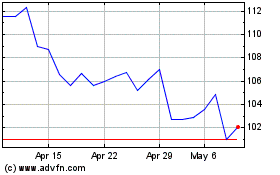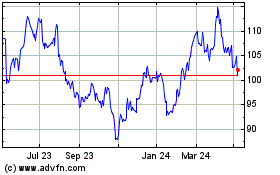By Brent Kendall, Timothy Puko and Ben Foldy
WASHINGTON -- California Sen. Kamala Harris asked the Justice
Department's inspector general to investigate why the department
opened an antitrust probe of four car companies who struck a deal
with California on vehicle-emissions standards.
Ms. Harris, a Democratic presidential candidate, said Friday in
a letter to DOJ Inspector General Michael Horowitz that there were
"serious questions about whether federal law enforcement is being
used to coerce the four auto makers to abandon their efforts to
make cleaner, less-polluting vehicles."
Ms. Harris's letter comes as additional details are emerging
about the Justice Department's interest in the agreement reached in
July between the California Air Resources Board and Ford Motor Co.,
Honda Motor Co., BMW AG and Volkswagen AG.
Under the deal, the companies pledged to reduce their greenhouse
gas emissions by 3.7% annually from model years 2022 to 2026,
getting some credit toward that goal by selling electric vehicles.
The targets are tamer than those adopted under President Obama but
more stringent than those proposed by the Trump administration,
which is seeking to roll back the Obama-era rules intended to cut
the auto industry's contribution to climate change.
A recent Justice Department letter to the car makers, reviewed
by The Wall Street Journal, suggests the department isn't sure what
to make of the emissions agreement. The brief letter, dated Aug. 28
and signed by Makan Delrahim, head of the antitrust division, said
the department learned of the deal from recent media reports and
had questions about whether the car companies effectively brokered
the deal among themselves, which "may violate antitrust laws," it
said.
"Although we have reached no conclusions, based on what has been
reported, we are concerned," the letter said. The department asked
the auto makers to provide more information, including the context
for the agreement and the communications that led to it.
People familiar with the Justice Department's thinking say
officials view their query as a fact-finding effort. Mr. Delrahim,
in a reporter scrum during a New York public appearance Thursday,
suggested that criticisms of his division were misinformed.
A Ford spokeswoman referred to an earlier company statement that
it would cooperate in any inquiry. A Volkswagen spokesman said, "We
are in regular contact with U.S. authorities on a number of
matters, but do not comment on specific private communications we
may or may not receive."
The other two auto makers didn't respond to requests for
comment.
Court precedent gives companies clear legal protection to
jointly lobby the government, though the legal doctrine also has
limits. Past cases say that if companies reach an anticompetitive
private agreement among themselves and then ask the government to
bless it, that conduct wouldn't be immune from antitrust
liability.
Critics are suspicious of the department's motives given that
the Trump administration is in a pitched political battle with
California over appropriate fuel-economy standards. In recent
weeks, top administration officials have aimed to strike back
quickly at the state because of its deal with the four auto makers,
an effort that has included trying to expedite the new federal
rules and revoking California's authority to set its own.
Ms. Harris's letter Friday said there were "questions about
whether the machinery of the Justice Department is being used for
partisan political purposes."
Earlier this week, House Judiciary Committee Chairman Jerrold
Nadler (D., N.Y.) and Rep. David Cicilline (D., R.I.), the chairman
of a House antitrust subcommittee, also expressed concerns and said
they planned to examine the Justice Department's actions.
The Journal first broke news of the DOJ inquiry on Sept. 6.
Later that day, the federal Transportation Department and
Environmental Protection Agency sent a joint letter to Mary
Nichols, chair of the California Air Resources Board, that said the
state's deal with the auto makers "appears to be inconsistent with
federal law."
Ms. Nichols in an interview said she wasn't worried about the
Justice Department's taking aim at the framework agreement with the
car makers.
The deal's framework was developed through talks with the
companies individually, she said, and all parties were mindful not
to violate antitrust statutes.
"As we've regulated these companies over many years, we've also
had voluntary agreements with these companies over many years," Ms.
Nichols said. "They have very good lawyers who advise them on these
issues and they would never transgress those rules."
The board is set to discuss the agreement at a public meeting in
Sacramento on September 19.
Countries world-wide are setting more stringent emissions
standards, putting pressure on auto makers to produce more
low-emissions vehicles at a time when low energy prices are pushing
consumers toward crossovers and trucks that burn more gasoline.
Meeting that challenge is costly, and the auto makers are more
likely to reduce those costs by agreeing to work together to meet
the same standards, analysts said, adding that they could even,
potentially, share innovations in emission controls, analysts
said.
"A lot of auto makers are looking at that longer term gain,"
said Ed Kim, vice president for industry analysis at AutoPacific
Inc. "And California's standards are more in line with what the
rest of the world is doing."
Write to Brent Kendall at brent.kendall@wsj.com, Timothy Puko at
tim.puko@wsj.com and Ben Foldy at Ben.Foldy@wsj.com
(END) Dow Jones Newswires
September 13, 2019 18:02 ET (22:02 GMT)
Copyright (c) 2019 Dow Jones & Company, Inc.
Bayerische Motoren Werke (TG:BMW)
Historical Stock Chart
From Mar 2024 to Apr 2024

Bayerische Motoren Werke (TG:BMW)
Historical Stock Chart
From Apr 2023 to Apr 2024
